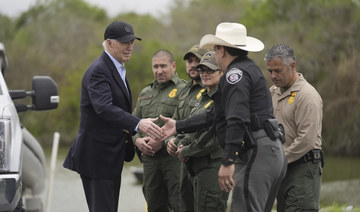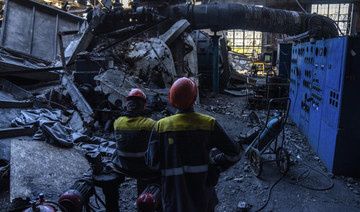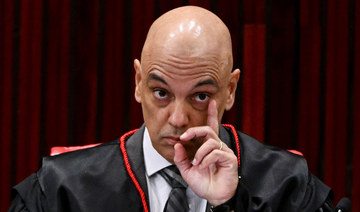GUATEMALA CITY: When Pope Francis visits Panama this week, he arrives not only as the first Latin American pontiff to visit Central America but as perhaps the world’s most prominent advocate for migrants at a time when migration has become a pressing political issue in the region and elsewhere.
The Argentine-born son of Italian immigrants has long held the issue dear to his heart and has signaled that it will be a central theme during the trip, which comes as the latest caravan of Central Americans is wending its way toward the US-Mexico frontier and President Donald Trump’s promised border wall has led to the longest government shutdown in the country’s history.
Francis’ emphasis on fundamental Christian teaching about welcoming the stranger, clothing the naked and feeding the hungry has been a breath of sustenance for those involved in efforts to aid migrants in Central America and Mexico, where Catholic priests, nuns and laypeople have taken the lead on attending to migrants amid what is often a vacuum of inaction and indifference by governments — or even outright hostility.
“It has been so hard, even within the church itself, to convince (people) that helping migrants is precisely part of the work of the church,” said Lidia Mara Souza, coordinator of the group Pastoral of Human Mobility in Honduras.
“But the pope has supported us tremendously, and I think now he comes to help us,” added Souza, a nun of the Scalabrinian order, which aids migrants as its vocation and is present along the length of the migratory route. “He must remind the politicians who declare themselves to be Christians to be that for real.”
The migratory trail north from Mexico and the violent Northern Triangle region of Central America is fraught with peril. Criminal gangs control much of the route and prey upon migrants, who are often stigmatized and face discrimination as they travel distances as long as 3,000 miles (5,000 kilometers) with little but dreams in their backpacks.
All along the way, they rely on a network of support in the form of Catholic-run shelters where they can find a place to sleep, be safe from the cartels and get a meal or advice.
Scalabrinians were among the first to start ministering to migrants in this part of the world, in the mid-1980s opening a shelter in Tijuana, across from San Diego. At the time, migration was largely an ignored phenomenon, said Bishop Raul Vera of Saltillo in northern Mexico, one of the first Mexicans to get involved in the cause.
Little by little, Vera said, the network of safe houses tied to the church sprang up over the following decades to reach the current number of over 80 in Mexico, El Salvador, Guatemala and Honduras.
“The migrants became the messengers,” the bishop said. “They told us, ‘Here they mistreat us, here they receive us well.’ And that way we began to see that in many places we were duplicating efforts and we began to coordinate among ourselves.”
In Honduras, Souza recalled, nuns attended to refugees from civil wars in El Salvador, Guatemala and Nicaragua, but soon they realized that many people were also leaving that country and still more were being returned from the United States. Now their main focus is on deportees, who in some ways are the most vulnerable.
“When the systematic deportations from the United States began, those who came back were people linked to the gangs, and I think the stigma was created that deportees are criminals and we shouldn’t help them,” Souza said.
Today many deportees to Central America are people who fled gang threats in the first place, and are sometimes hunted down and murdered once back home.
Shelters have expanded the services they offer to include medical, legal and psychological aid. Workers have also had to learn how to attend to migrants victimized by gangs — robbery, kidnapping, extortion, sexual assault, murder or disappearance.
“It has been very hard,” said the Rev. Alejandro Solalinde, who runs a shelter in Ixtepec in southern Mexico where human trafficking is big cartel business. “We are talking about organized crime and authorized crime,” he added, a reference to complicity by authorities.
Vera said Francis has given clear instructions on attending to migrants that can be summed in four verbs: welcome, protect, promote and integrate.
Putting those into practice is more important than ever in the face of caravans born out of poverty and violence in the region, according to Mauro Verzeletti, director of the Casa del Migrante shelter in Guatemala City.
“From now on it will be a modality of the migratory phenomenon because the countries of Central America have collapsed and are not working for the welfare of the people,” Verzeletti has said in the past.
The caravans over the last year have strained capacity, and workers fear that is unlikely to abate.
In the Guatemalan city of Tecun Uman, on Mexico’s southern border, Jairo Reyes, a participant in the caravan, was sleeping on cardboard in a park this weekend after there hadn’t been room at Casa del Migrante. Reyes is an evangelical Christian but was grateful to the Catholic shelter, which gave him a stroller for his 2-year-old baby, which he had previously been carrying in his arms.
“We are all children of God,” said the 31-year-old single father, also traveling with a 4-year-old.
Reyes was happy to think that Francis would come to Central America and advocate for migrants like them, saying, “May he touch people’s hearts.”
Since his pontificate began in 2013, Francis has demanded governments do more to welcome and integrate those fleeing conflict, natural disasters and poverty. He has matched his preaching with practice, famously bringing a dozen Syrian refugees with him when he traveled to a refugee camp on Lesbos, Greece, and celebrating a Mass for migrants on the Sicilian island of Lampedusa, ground zero in Europe’s migration crisis, in his first trip outside Rome.
He has also responded to Trump’s demand for a wall on the US-Mexico border with calls for “bridges not walls.” When asked specifically about Trump’s plans, after a trip to the border to celebrate Mass, Francis said anyone who wants to build a wall “isn’t Christian.”
That resonates strongly among the Scalabrinians who devote their work to migrants.
“Walls are not for human beings,” Souza said by phone from Honduras. “They are for merchandise and for organized crime.”
Andrew Chesnut, a professor of religious studies at Virginia Commonwealth University, said that in Panama, Francis is likely to make “a prophetic call for governments, above all the United States and Mexico, to receive Central American migrants with respect and dignity” in addition to denouncing poverty, corruption, drug violence and killings of women.
The church as an institution has not always fully supported efforts to aid migrants, but Francis’ renewed emphasis on caring for the most vulnerable has inspired those working in the network.
“It changed a lot, and it could change more if many (Latin American) bishops paid attention to him,” Solalinde said.
“We are in very important times of change in which the Catholic Church has a great opportunity, but it is not easy because it has been too captive to rigid structures that do not let it advance,” Solalinde said. “The migrant offers us the possibility of once again being a poor, pilgrim, missionary and itinerant church.”
Pope visit to Central America highlights church ministry to migrants
Pope visit to Central America highlights church ministry to migrants
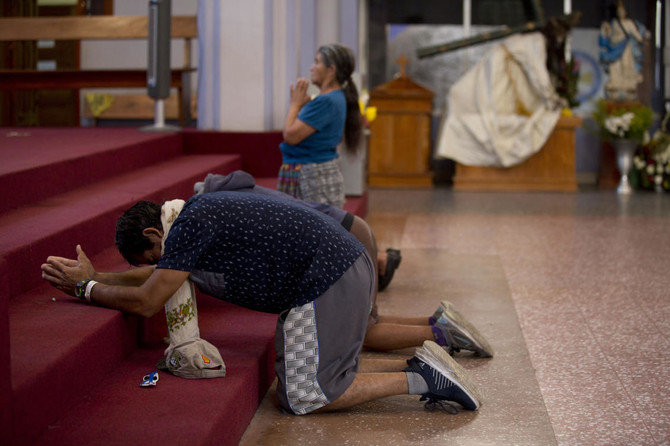
- The Argentine-born son of Italian immigrants has long held migration issue dear to his heart and has signaled that it will be a central theme during the trip
- Since his pontificate began in 2013, Francis has demanded governments do more to welcome and integrate those fleeing conflict, natural disasters and poverty
Trump says Biden administration uses ‘Gestapo’ tactics: US media

- The “Gestapo” comment came as the campaign has begun heating up, and it follows several other Trump remarks that critics have said are dangerously inflammatory, including calling political rivals “vermin” and comparing immigrants to “animals”
WASHINGTON: Former president Donald Trump has sharpened his allegation that his Democratic successor has weaponized the US justice system against him, comparing Joe Biden’s tactics to those of Hitler’s Gestapo, American media reported Sunday.
The Republican 2024 presidential candidate made the remark during a private meeting Saturday with top party leaders and wealthy donors at his Mar-a-Lago resort in Florida, according to a recording provided to US media by one donor.
In a 90-minute speech, Trump accused the Democrats of “running a Gestapo administration,” referring to the secret police force in Nazi Germany. “It’s the only way they’re going to win,” he said.
The “Gestapo” comment came as the campaign has begun heating up, and it follows several other Trump remarks that critics have said are dangerously inflammatory, including calling political rivals “vermin” and comparing immigrants to “animals.”
His comments in Mar-a-Lago brought loud applause from the audience, which included a number of potential vice presidential picks, according to Politico.
He again lashed out at the prosecutors who have brought four separate court cases against him, including the hush-money trial now taking place in New York.
Trump denounced what he claimed was a “witch hunt” hatched by the Democratic administration to eliminate his key presidential rival.
The White House, which has denied any involvement in the legal cases, denounced Trump’s comments on Sunday.
“Instead of echoing the appalling rhetoric of fascists, lunching with Neo Nazis, and fanning debunked conspiracy theories that have cost brave police officers their lives, President Biden is bringing the American people together around our shared democratic values and the rule of law,” spokesman Andrew Bates said.
Biden’s campaign also responded, saying the Republican’s angry remarks confirmed “what we already knew: Trump’s campaign is about him. His fury, his revenge, his lies, and his retribution.”
Anti-war protesters leave USC after police arrive, while Northeastern ceremony proceeds calmly
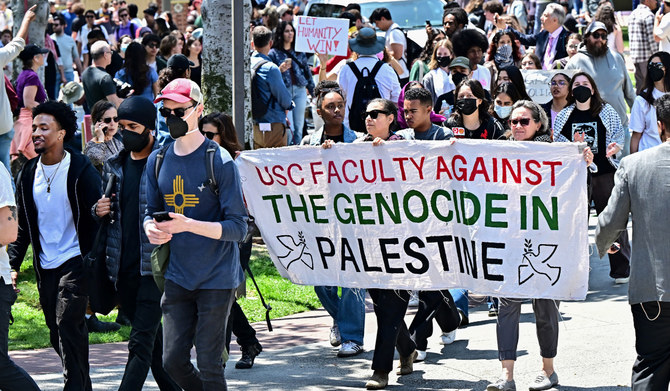
- Israel has killed more than 34,000 Palestinians, according to Gaza’s Health Ministry
WASHINGTON: Students protesting the war in Gaza abandoned their camp at the University of Southern California early Sunday after being surrounded by police and threatened with arrest, while Northeastern University’s commencement began peacefully at Boston’s Fenway Park.
Developments in both places were being watched closely following scores of arrests last month — 94 people at USC in Los Angeles and about 100 at Northeastern in Boston.
Dozens of Los Angeles Police Department officers arrived about 4 a.m. at USC to assist campus safety officers. The university had warned of arrests on social media and in person. Video showed some protesters packing up and leaving, while officers formed lines to push others away from the camp as it emptied out. The university said there were no reports of any arrests.
USC President Carol Folt said it was time to draw a line because “the occupation was spiraling in a dangerous direction” with areas of campus blocked and people being harassed.
“The operation was peaceful,” Folt wrote in an update. “Campus is opening, students are returning to prepare for finals, and commencement set-up is in full swing.”
USC earlier canceled its main graduation ceremony while allowing other commencement activities to continue.
At the Northeastern commencement Sunday, some students waved small Palestinian and Israeli flags, but were outnumbered by those waving the flags of India and the US, among others. Undergraduate student speaker Rebecca Bamidele drew brief cheers when she called for peace in Gaza.
The Associated Press has tallied about 2,500 people arrested at about 50 campuses since April 18, based on its reporting and statements from universities and law enforcement.
Arrests continued apace over the weekend. At the University of Virginia, there were 25 arrests Saturday for trespassing after police clashed with protesters who refused to remove tents. At the Art Institute of Chicago campus, police cleared a pro-Palestinian encampment hours after it was set up Saturday and arrested 68 people, saying they would be charged with criminal trespass.
ARRESTS IN VIRGINIA
In Charlottesville, Virginia, student demonstrators began their protest on a lawn outside the school chapel Tuesday. Video on Saturday showed police in riot gear and holding shields lined up on campus, while protesters chanted “Free Palestine.”
As police moved in, students were pushed to the ground, pulled by their arms and sprayed with a chemical irritant, Laura Goldblatt, an assistant professor who has been helping the demonstrators, told The Washington Post. The university said protesters were told that tents were banned under school policy and were asked to remove them.
Virginia Attorney General Jason Miyares told Fox News on Sunday the police response was justified because students had been warned repeatedly to leave, were violating the school’s conduct code, and that outsiders who were not students provided protesters with supplies like wooden barriers.
“We’ve seen folks that are not students show up in riot gear with bull horns to direct the protesters on how to flank our officers,” Miyares said.
He said some had put bear spray into water bottles and thrown them at officers.
It was the latest clash in weeks of protests and tension at US colleges and universities.
Tent encampments of protesters urging universities to stop doing business with Israel or companies they say support the war in Gaza have spread in a student movement unlike any other this century. Some schools reached agreements with protesters to end the demonstrations and reduce the possibility of disrupting final exams and commencements.
DEMONSTRATIONS AMID COMMENCEMENT
The University of Michigan was among the schools bracing for protests during commencement this weekend, as were Indiana University, Ohio State University and Northeastern. More ceremonies are planned in the coming weeks.
In Ann Arbor, there was a protest at the beginning of the event at Michigan Stadium. About 75 people, many wearing traditional Arabic kaffiyehs along with their graduation caps, marched up the main aisle toward the stage.
They chanted “Regents, regents, you can’t hide! You are funding genocide!” while holding signs, including one that read: “No universities left in Gaza.”
Overhead, planes pulled banners with competing messages. “Divest from Israel now! Free Palestine!” and “We stand with Israel. Jewish lives matter.”
Officials said no one was arrested, and the protest didn’t seriously interrupt the nearly two-hour event, attended by tens of thousands of people, some of them waving Israeli flags.
OTHER PROTESTS CONTINUE
At Indiana University, protesters urged supporters to wear their kaffiyehs and walk out during remarks by school President Pamela Whitten on Saturday evening. The Bloomington campus designated a protest zone outside Memorial Stadium, where the ceremony was held.
At Princeton University in New Jersey, 18 students began a hunger strike to try to push the university to divest from companies tied to Israel. Students at other colleges, including Brown and Yale, launched similar hunger strikes this year before the more recent wave of demonstrations.
The protests stem from the conflict that started Oct. 7 when Hamas militants attacked southern Israel, killing about 1,200 people, mostly civilians, and taking roughly 250 hostages. Vowing to destroy Hamas, Israel launched an offensive in Gaza that has killed more than 34,500 Palestinians, about two-thirds of them women and children, according to the Health Ministry in the Hamas-ruled territory. Israeli strikes have devastated the enclave and displaced most of its inhabitants.
China’s Xi in France for Macron talks on Ukraine
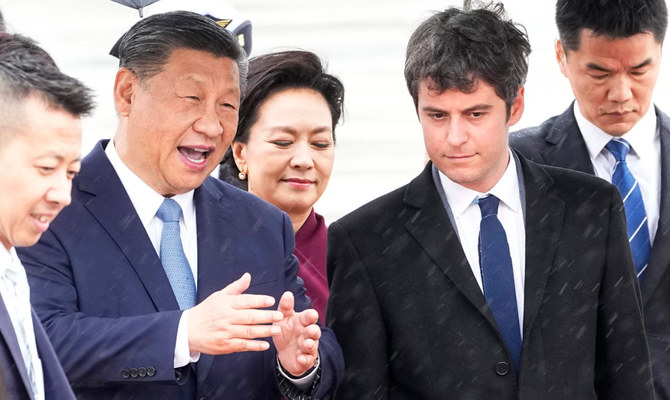
- Tuesday will see Macron take Xi to the Pyrenees mountains to an area he used to visit as a boy for a day of less public talks
PARIS: Chinese President Xi Jinping arrived in France Sunday on a state visit hosted by Emmanuel Macron where the French leader will seek to warn his counterpart against backing Russia in the conflict over Ukraine.
Xi’s arrival for the visit marking 60 years of diplomatic relations between France and China heralded the start of his first trip to Europe since 2019, which will also see him visit Serbia and Hungary.
But Xi’s choice of France as the sole major European power to visit indicates the relative warmth in Sino-French relations since Macron made his own state visit to China in April 2023 and acknowledges the French leader’s stature as an EU powerbroker.
The leader of the one-party Communist state of more than 1.4 billion people, accompanied by his wife Peng Liyuan, was welcomed under umbrellas at a drizzly Paris Orly airport by Prime Minister Gabriel Attal.
Xi is to hold a day of talks in Paris on Monday — also including EU Commission chief Ursula von der Leyen — followed by a state banquet hosted by Macron at the Elysee.
Tuesday will see Macron take Xi to the Pyrenees mountains to an area he used to visit as a boy for a day of less public talks.
In an op-ed for Le Figaro daily, Xi said that he wanted to work with the international community to find ways to solve the conflict sparked by Russia’s invasion of Ukraine, while emphasising that China was “neither a party nor a participant” in the conflict.
“We hope that peace and stability will return quickly to Europe and intend to work with France and the entire international community to find good paths to resolve the crisis,” he wrote.
A key priority of Macron will be to warn Xi of the danger of backing Russia, with Western officials concerned Moscow is already using Chinese machine tools in arms production.
Beijing’s ties with Moscow have, if anything, warmed after the invasion and the West wants China above all not to supply weapons to Russia and risk tipping the balance in the conflict.
“It is in our interest to get China to weigh in on the stability of the international order,” said Macron in an interview with The Economist published on Thursday.
Macron also said in the interview that Europe must defend its “strategic interests” in its economic relations with China, accusing Beijing of not respecting the rules on international trade.
But he acknowledged in an interview with the La Tribune Dimanche newspaper that Europeans are “not unanimous” on the strategy to adopt as “certain actors still see China essentially as a market of opportunities” while it “exports massively” to Europe.
The French president had gladdened Chinese state media and troubled some EU allies after his 2023 visit by declaring that Europe should not be drawn into a “bloc versus bloc” standoff between China and the United States, particularly over democratic, self-ruled Taiwan.
China views the island as part of its territory and has vowed to take it one day, by force if necessary.
Rights groups are urging Macron to bring up human rights in the talks, accusing China of failing to respect the rights of the Uyghur Muslim minority and of keeping dozens of journalists behind bars.
“President Macron should make it clear to Xi Jinping that Beijing’s crimes against humanity come with consequences for China’s relations with France,” said Maya Wang, acting China director at Human Rights Watch.
The group said human rights in China had “severely deteriorated” under Xi’s rule.
A crowd of protesters on Sunday unfurled a Tibetan flag at a demonstration in Paris, accusing Xi of being a “dictator” and wanting to erase local culture in the Tibet region, an AFP reporter said. Paris police put the number of protesters at two thousand.
However analysts are skeptical that Macron will be able to exercise much sway over the Chinese leader, even with the lavish red carpet welcome and a trip to the bracing mountain airs of the Col du Tourmalet over 2,000 meters (6,560 feet) above sea level on Tuesday.
The other two countries chosen by Xi for his tour, Serbia and Hungary, are seen as among the most sympathetic to Moscow in Europe.
“The two core messages from Macron will be on Chinese support to Russia’s military capabilities and Chinese market-distorting practices,” said Janka Oertel, director of the Asia program at the European Council on Foreign Relations.
“However, both messages are unlikely to have a significant impact on Chinese behavior: Xi is not on a mission to repair ties, because from his point of view all is well.”
Niger receives new Russian advisers, equipment
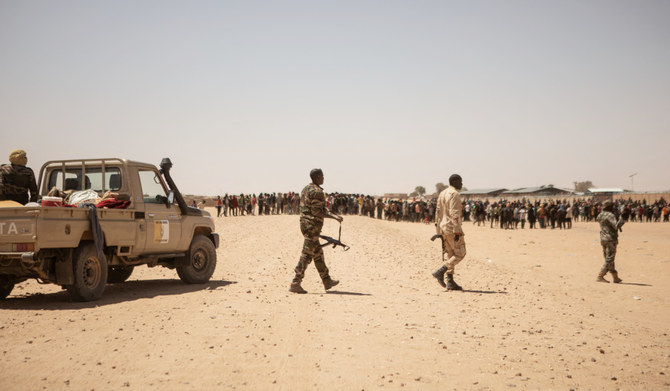
- US Defense Secretary Lloyd Austin indicated on Thursday that Russian troops were now installed at a Nigerien air base near the Niamey airport that also houses US troops
NIAMEY: New Russian military advisers and military equipment have arrived in Niger, according to state television in the African country that wants US forces to leave.
A first set of about 100 Russian advisers arrived in Niger on April 10, along with air defense systems.
Two military transporters arrived on Saturday, according to Tele Sahel that said Russia has now sent three cargo planes of military material and instructors in the past month.
The Africa Corps, seen as the successors of the Wagner paramilitary group in Africa, confirmed the instructors’ arrival in a posting on the group’s Telegram account.
FASTFACT
US Defense Secretary Lloyd Austin indicated that Russian troops were now installed at an air base near the Niamey airport that also houses US troops.
On Saturday, it said more trainers, equipment, and food products had arrived.
US Defense Secretary Lloyd Austin indicated on Thursday that Russian troops were now installed at a Nigerien air base near the Niamey airport that also houses US troops.
Niger’s military regime, which took power in a July 2023 coup, expelled French troops based in the country and then denounced a military cooperation agreement with the US.
It said this had been “unilaterally imposed” by Washington.
Washington agreed in April to withdraw roughly 1,000 soldiers from the country.
Negotiations are underway between the United States and Niger about the withdrawal.
US forces have a key drone base near Agadez, built at a cost of about $100 million.
Niger’s military leaders have moved closer to Russia, as have Mali and Burkina Faso, which also have military coup leaders and are fighting rebel groups affiliated with Al-Qaeda and Daesh.
In April, Idrissa Soumana Maiga, head of the private L’Enqueteur newspaper, was imprisoned after an article mentioned the “presumed” installation of Russian listening devices in official buildings.
Brazil mounts frantic rescue effort as flooding kills at least 78

- The rainfall eased Saturday night but was expected to continue for the next 24-36 hours, with authorities warning of landslides
PORTO ALEGRE, Brazil: Authorities in southern Brazil scrambled Sunday to rescue people from raging floods and mudslides in what has become the region’s largest ever climate catastrophe, with at least 78 dead and 115,000 forced from their homes.
Entire cities were underwater, with thousands of people cut off from the world by the floodwater, brought by days of torrential rains.
In Porto Alegre, the capital of Rio Grande do Sul state, residents stood on rooftops hoping to be rescued as others in canoes or small boats navigated streets that have become rivers.
After what one climatologist called “a disastrous cocktail” of climate change and the El Nino effect, more than 3,000 soldiers, firefighters and other rescuers were trying to reach residents, who were in many cases trapped without basic supplies such as running water or electricity.
Civil defense officials said at least 105 people were missing in the latest of a string of catastrophic weather events to hit the South American giant.
“It looks like a scene out of a war, and after it is over it will require a post-war approach,” Rio Grande do Sul governor Eduardo Leite said, flanked by President Luiz Inacio Lula da Silva and several government ministers.
FASTFACT
The Guaiba River, which flows through the city of 1.4 million people, reached a record high level of 5.09 meters, according to the local municipality, well above the historic peak of 4.76 meters that had stood as a record since devastating 1941 floods.
Lula promised the government would provide all necessary resources for reconstruction.
Besides Porto Alegre, another 341 towns and villages have been hit by the flooding.
Soldiers are setting up field hospitals after hundreds of patients had to be evacuated from regular hospitals, while civilians have also formed volunteer groups to gather basic supplies, including life jackets, water and fuel.
“Everyone helps in their own way, as they can,” said Luis Eduardo da Silva, a 32-year-old volunteer.
The Guaiba River, which flows through the city of 1.4 million people, reached a record high level of 5.3 meters (17.4 feet), according to the local municipality, well above the historic peak of 4.76 meters that had stood as a record since devastating 1941 floods.
“Rio Grande do Sul has always been a meeting point between tropical and polar air masses,” climatologist Francisco Elizeu Aquino told AFP.
“But these interactions intensified with climate change” to create “a disastrous cocktail that makes the atmosphere more unstable and encourages storms.”
Rosana Custodio, a 37-year-old nurse, fled her flooded Porto Alegre home with her husband and three children.
“During the night on Thursday the waters began to rise very quickly,” she told AFP via a WhatsApp message.
“In a hurry, we went out to look for a safer place. But we couldn’t walk... My husband put our two little ones in a kayak and rowed with bamboo. My son and I swam to the end of the street,” she said.
Her family was safe, but “we’ve lost everything we had.”
Authorities scrambled to evacuate swamped neighborhoods as rescue workers used four-wheel-drive vehicles — and even jet skis — to maneuver through waist-deep water in search of the stranded.
Governor Leite said his state, normally one of Brazil’s most prosperous, would need heavy investment to rebuild.
Long lines formed as people tried to board buses, although bus services to and from the city center were canceled.
The Porto Alegre international airport suspended all flights on Friday for an undetermined period, with its runways underwater.
Lula posted a video of a helicopter depositing a soldier atop a house, who then used a brick to pound a hole in the roof and rescue a baby wrapped in a blanket.
The speed of the rising waters unnerved many.
“It’s terrifying because we saw the water rise in an absurd way, it rose at a very high speed,” said Greta Bittencourt, a 32-year-old professional poker player.
Leite said this was the worst natural disaster in the history of Rio Grande do Sul, which is home to agroindustrial production of soy, rice, wheat and corn.
Lula, who visited the state twice in a matter of days, has blamed the disaster on climate change.
South America’s largest country has recently experienced a string of extreme weather events, including a cyclone in September that killed at least 31 people.




